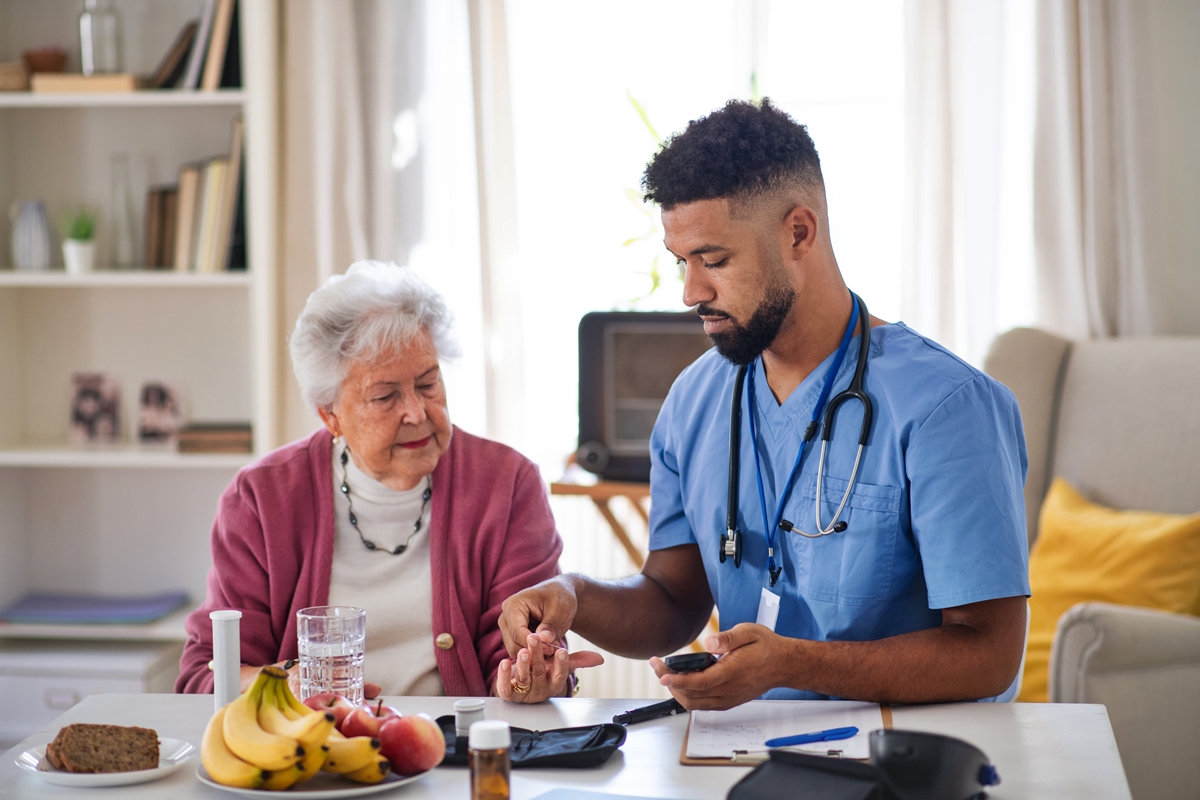Home>Misc>Featured>What Can An Individual Do To Further Public Health


Featured
What Can An Individual Do To Further Public Health
Modified: January 22, 2024
Discover the featured ways to enhance public health. Learn about actionable steps individuals can take to contribute to the betterment of public health.
Introduction
Public health is a vital aspect of society that aims to promote and protect the well-being of communities and individuals. It encompasses a range of initiatives and policies designed to prevent diseases, prolong life, and improve the quality of life for everyone. While public health is often associated with the work of government organizations and healthcare professionals, individuals also play a crucial role in furthering public health.
In today’s interconnected world, individual actions can have a significant impact on the health and well-being of both themselves and those around them. By adopting healthy behaviors, advocating for policy change, participating in community initiatives, supporting public health organizations, and educating others, individuals can contribute to the advancement of public health.
In this article, we will explore various ways in which individuals can actively participate in and further public health. Each of these actions, when combined, can create a collective force that promotes a healthier society.
So, whether you’re an individual looking to make a positive difference or a public health enthusiast seeking ways to get involved, this article will provide you with valuable insights and practical strategies to promote public health.
Importance of Public Health
Public health plays a critical role in ensuring the well-being of individuals, communities, and society as a whole. It focuses on preventing diseases, promoting healthy behaviors, and addressing health disparities to enhance overall quality of life.
One of the key reasons public health is essential is its emphasis on disease prevention. Rather than solely focusing on treatment after individuals become ill, public health strategies aim to prevent diseases from occurring in the first place. By promoting vaccinations, implementing sanitation measures, and educating the public about healthy habits, public health initiatives reduce the risk of widespread illnesses and improve longevity.
Furthermore, public health addresses health disparities and aims to achieve health equity for all members of society. It recognizes that factors such as socioeconomic status, race, education, and access to healthcare can significantly impact an individual’s health outcomes. By addressing these disparities and working towards equitable access to healthcare services and resources, public health initiatives strive to ensure that everyone has an equal opportunity to live a healthy life.
Public health also plays a crucial role in emergency preparedness and response. Whether it’s a natural disaster, a disease outbreak, or a public health crisis, public health professionals are at the forefront of managing and mitigating the impact of such events. Through surveillance, rapid response systems, and coordination with various stakeholders, public health measures help protect communities and save lives in times of crisis.
Moreover, public health has numerous economic benefits. By preventing disease and promoting healthy behaviors, public health initiatives reduce healthcare costs and improve productivity. A healthier population means fewer healthcare expenses and increased economic growth and stability.
Overall, public health is essential for promoting well-being, preventing diseases, addressing health disparities, ensuring emergency preparedness, and improving economic stability. It is a collective effort that requires the active participation and support of individuals, communities, governments, and organizations to achieve meaningful and long-lasting results.
Understanding the Role of an Individual
While public health efforts are often led by government organizations and healthcare professionals, individual actions and participation are key to advancing public health. Each person has the power to make a difference and contribute to the well-being of their communities and society as a whole.
One crucial aspect of understanding the role of an individual in public health is recognizing the influence of personal behavior on health outcomes. Adopting healthy habits such as regular exercise, a balanced diet, adequate sleep, and tobacco cessation can significantly reduce the risk of chronic diseases and improve overall well-being. By taking responsibility for their own health, individuals not only positively impact their own lives but also serve as role models for others.
Additionally, individuals play a pivotal role in advocating for policy change. Public health policies shape the environments in which we live, work, and play. By staying informed about public health issues, engaging in discussions, and voicing their opinions to policymakers, individuals can help shape policies that promote healthier communities. This can involve supporting initiatives like smoke-free environments, access to nutritious food, and regulations on harmful substances.
Participating in community initiatives is another way in which individuals can contribute to public health. Local organizations and community groups often organize programs and initiatives that aim to address health issues and improve the well-being of the community. Volunteering time, resources, or expertise to support these initiatives can have a significant impact on community health. Whether it’s participating in a community cleanup event or volunteering at a local health clinic, every contribution matters.
Moreover, individuals can support public health organizations through donations or volunteer work. Public health organizations play a vital role in researching, implementing, and promoting health initiatives. By offering financial support or volunteer services to these organizations, individuals can directly contribute to their efforts in improving public health outcomes.
Lastly, education is a powerful tool in furthering public health. Individuals can play the role of educators by sharing their knowledge and promoting awareness of public health issues among their family, friends, and social circles. Be it through social media, community gatherings, or informal conversations, actively educating others about the importance of public health empowers them to make informed decisions and take actions that contribute to the well-being of themselves and their communities.
Overall, as an individual, your actions, choices, and contributions matter in advancing public health. By adopting healthy behaviors, advocating for policy change, participating in community initiatives, supporting public health organizations, and educating others, you can make a tangible difference in promoting the well-being of your community and society at large.
Promoting Healthy Behaviors
One of the most impactful ways individuals can contribute to public health is by promoting healthy behaviors. By adopting and encouraging healthy habits, individuals can positively influence their own well-being and inspire those around them to do the same.
First and foremost, individuals can prioritize their own health by adopting a balanced and nutritious diet. Consuming a variety of fruits, vegetables, whole grains, and lean proteins can provide the body with essential nutrients and reduce the risk of chronic diseases such as heart disease, diabetes, and obesity. Additionally, individuals should strive to drink an adequate amount of water every day and limit their intake of sugary beverages.
Regular physical activity is another crucial aspect of promoting a healthy lifestyle. Engaging in moderate-intensity aerobic activities, such as brisk walking, cycling, or swimming, for at least 150 minutes per week can improve cardiovascular health, strengthen muscles, and enhance overall well-being. Encouraging friends, family, and colleagues to join in physical activities can create a supportive environment and foster a culture of fitness.
Furthermore, individuals should prioritize getting enough sleep. Quality sleep is essential for physical and mental health, as it allows the body to rest, repair, and rejuvenate. It is recommended that adults aim for seven to nine hours of sleep per night to optimize their well-being.
Another important aspect of promoting healthy behaviors is avoiding tobacco and excessive alcohol consumption. Tobacco use is a leading cause of preventable diseases, including various types of cancer, respiratory illnesses, and cardiovascular conditions. Individuals should strive to quit smoking and provide support to others who want to quit. Similarly, excessive alcohol consumption can lead to a range of health issues, including liver disease, alcohol dependency, and mental health problems. Encouraging responsible drinking habits and supporting those struggling with alcohol addiction is crucial for promoting public health.
Lastly, individuals should prioritize their mental health. Practices such as stress management, mindfulness, and seeking support when needed are essential for maintaining good mental well-being. Taking time for self-care, engaging in hobbies and activities that bring joy, and building strong social connections can all contribute to positive mental health.
By promoting healthy behaviors in their own lives and encouraging others to do the same, individuals can create a ripple effect that extends beyond themselves. Through their actions and influence, healthier habits can become the norm, leading to improved overall well-being and contributing to the advancement of public health.
Advocating for Policy Change
Advocating for policy change is a powerful way individuals can contribute to public health. Public health policies have a significant impact on the well-being of communities and can help create a supportive environment for individuals to make healthy choices. By advocating for evidence-based policies, individuals can influence decision-makers and drive positive change.
One effective way to advocate for policy change is by staying informed about public health issues. Understanding the latest research, evidence, and best practices allows individuals to make informed arguments and engage in meaningful conversations. It is important to be knowledgeable about the potential impacts of specific policies and how they align with public health goals.
Getting involved in local and national advocacy organizations can also amplify individual voices and create a collaborative effort for policy change. These organizations often have networks, resources, and platforms that individuals can utilize to advocate more effectively. By joining forces with like-minded individuals, individuals can strengthen their advocacy efforts and make a greater impact.
Engaging with policymakers is another crucial aspect of advocating for policy change. Writing letters, making phone calls, and scheduling meetings with elected officials can provide individuals with the opportunity to express their concerns, provide evidence-based recommendations, and advocate for specific policies. Sharing personal stories and connecting policy issues to real-life experiences can be particularly compelling in influencing policymakers’ decision-making process.
Engaging in public consultations and participating in public hearings are additional ways individuals can advocate for policy change. These events provide a chance to share perspectives, present evidence, and engage in constructive discussions with policymakers and other stakeholders. By actively participating, individuals can contribute to the development of policies that align with public health goals.
Additionally, individuals can use social media platforms to advocate for policy change. Sharing educational content, statistics, and personal experiences related to public health issues can raise awareness among a larger audience and generate support for specific policies. Utilizing relevant hashtags and engaging with policymakers and influencers can help create momentum for change.
Lastly, supporting and voting for candidates who prioritize public health policies is crucial. Participating in elections and being aware of the positions and track records of political candidates allows individuals to support those who are committed to advancing public health initiatives. By using their voting power, individuals can help shape the future of public health policies.
Advocating for policy change is an instrumental way individuals can contribute to public health. By staying informed, getting involved with advocacy organizations, engaging with policymakers, participating in public consultations, utilizing social media, and supporting candidates who prioritize public health, individuals can help drive positive policy change that benefits the well-being of communities and society at large.
Participating in Community Initiatives
Participating in community initiatives is a powerful way for individuals to contribute to public health. Community-driven initiatives focus on addressing health issues, promoting well-being, and improving the overall health outcomes of the community. By actively engaging in these initiatives, individuals can make a tangible difference in their local communities.
One way individuals can participate in community initiatives is by volunteering their time and skills. Local organizations often rely on volunteers to implement programs, organize events, and provide resources to community members in need. Whether it’s volunteering at a local food bank, participating in a health fair, or mentoring youth, individuals can contribute their expertise and help create a healthier community.
Engaging in community health projects and campaigns is another impactful way to contribute. These projects may focus on education, prevention, and awareness of specific health issues such as obesity, substance abuse, or mental health. By actively participating in these initiatives, individuals can help disseminate important information, raise awareness, and encourage healthier behaviors among community members.
Collaborating with local schools, religious institutions, and neighborhood associations is also essential in participating in community initiatives. These organizations often have existing networks and resources that can be utilized to address health issues and promote well-being. By engaging in partnerships and collaborations, individuals can support the development and implementation of effective public health interventions at the community level.
Advocating for community health needs is another critical aspect of participating in community initiatives. By identifying health disparities and unmet needs in the community, individuals can advocate for relevant services, programs, and resources. This may involve engaging with local policymakers, attending town hall meetings, or organizing grassroots campaigns to generate support for addressing key health concerns.
Participating in community initiatives also presents an opportunity for individuals to empower and mobilize community members. By organizing community events, hosting workshops, or facilitating support groups, individuals can help empower others to take control of their health and make informed decisions. By fostering a sense of community ownership and engagement, individuals can create sustainable changes that promote public health.
Lastly, individuals can support local health initiatives financially. Donating to local health organizations or fundraising for community health projects can provide the necessary resources to implement critical programs and services. Individuals can also explore corporate sponsorship or grant opportunities to support community health initiatives on a larger scale.
Participating in community initiatives allows individuals to actively contribute to public health at the grassroots level. By volunteering, engaging in community health projects, collaborating with local organizations, advocating for community health needs, empowering and mobilizing community members, and providing financial support, individuals can make a significant impact on the well-being of their communities.
Supporting Public Health Organizations
Public health organizations play a crucial role in advancing public health initiatives and improving the well-being of communities. Individuals can contribute to these organizations by offering support in various ways, ensuring their vital work can continue and expand.
One way to support public health organizations is through financial contributions. Donating funds to these organizations helps them sustain their operations, conduct research, implement health programs, and provide essential services. Whether it’s a one-time donation or recurring contributions, every financial contribution makes a difference in enabling these organizations to address public health challenges effectively.
Volunteering time and expertise is another valuable way individuals can support public health organizations. Many organizations rely on volunteers to assist with various tasks such as data collection, community outreach, program implementation, and administrative work. By offering their skills and time, individuals can alleviate the workload of these organizations and contribute to their mission of promoting and protecting public health.
In addition to financial and volunteer support, individuals can also advocate for public health organizations. By raising awareness about their work, sharing their initiatives on social media, and encouraging others to support them, individuals can help these organizations expand their reach and impact. This advocacy can be crucial in securing necessary resources and garnering public support for public health initiatives.
Supporting public health organizations also means staying informed about their work and the issues they address. This enables individuals to engage in informed conversations, advocate for evidence-informed policies, and educate others about the importance of public health. By staying updated and sharing accurate information, individuals can become effective ambassadors for public health organizations and promote their vital role in the community.
Furthermore, individuals can consider building long-term partnerships with public health organizations. This may involve offering pro-bono services, collaborating on research projects, or forming strategic alliances to address specific health issues. By working together, individuals and public health organizations can leverage their respective strengths and resources to achieve shared goals and generate sustainable impact.
Ultimately, supporting public health organizations is an investment in the well-being of communities. Through financial contributions, volunteering, advocacy, staying informed, and forming partnerships, individuals can actively contribute to the growth and success of these organizations. By supporting the work of public health organizations, individuals play a vital role in advancing public health and creating healthier communities.
Educating Others about Public Health
Educating others about public health is a powerful way for individuals to contribute to the well-being of their communities. By sharing knowledge, raising awareness, and promoting informed decision-making, individuals can empower others to make positive changes and prioritize their health.
One effective approach to educating others about public health is through fostering conversations. Engaging in open and respectful discussions with family, friends, colleagues, and community members allows individuals to share valuable information, dispel myths, and address misconceptions. These conversations can cover a wide range of public health topics, from the importance of vaccination to the benefits of healthy lifestyles.
Utilizing social media platforms is another effective way to reach a broader audience and educate others about public health. Creating and sharing informative, evidence-based content can help raise awareness, debunk myths, and encourage healthier behaviors. By utilizing engaging visuals, sharing personal experiences, and providing accurate information, individuals can inspire others to take proactive steps towards improving their health.
Acting as a role model is another powerful form of education. By embodying healthy behaviors and making positive choices, individuals can motivate others to follow suit. Whether it’s maintaining a balanced diet, practicing regular exercise, or prioritizing mental well-being, showcasing personal commitment to a healthy lifestyle can influence others to do the same.
Participating in public speaking engagements or community workshops is an opportunity to educate a larger audience about public health. By sharing expertise, research, and best practices, individuals can effectively disseminate information, answer questions, and provide resources to community members. This can help individuals make more informed decisions and take actions that positively impact their health.
Collaborating with educational institutions, community centers, and local organizations is another avenue for educating others about public health. By delivering presentations or workshops at schools, participating in health fairs, or partnering with local organizations, individuals can directly engage with different segments of the community and provide valuable health education.
Lastly, individuals can consider becoming public health advocates or ambassadors. By undergoing training and acquiring the necessary knowledge, individuals can effectively represent public health interests in their communities. This may involve hosting information sessions, giving interviews to local media outlets, or participating in public health campaigns to raise awareness and promote positive health behaviors.
Educating others about public health is a proactive step towards building healthier communities. By engaging in conversations, utilizing social media, acting as role models, participating in public speaking engagements, collaborating with educational institutions and organizations, and becoming advocates, individuals can empower others to make informed decisions, prioritize their health, and contribute to the overall well-being of their communities.
Conclusion
Public health is a crucial aspect of society that benefits from the active participation and involvement of individuals. By understanding the significance of public health, individuals can take various actions to further its objectives and contribute to the well-being of their communities.
Through promoting healthy behaviors, individuals can prioritize their own well-being and inspire others to adopt healthier habits. By advocating for policy change, individuals can influence decision-makers and drive positive transformations that benefit public health. Participating in community initiatives enables individuals to directly engage with local organizations and address health issues at the grassroots level. Supporting public health organizations through financial contributions, volunteer work, and advocacy helps sustain their operations and expand their impact. Lastly, educating others about public health empowers individuals to make informed decisions and take proactive steps towards improving their well-being.
By combining these actions, individuals can contribute to a collective effort that advances public health on a broader scale. Whether it’s making healthier choices in their personal lives or engaging in advocacy at the community or policy level, individuals play a crucial role in creating healthier communities and improving the overall well-being of society.
So, let us embrace our individual responsibilities and actively participate in public health initiatives. Together, we can make a positive and lasting impact by prioritizing our health, advocating for change, and supporting organizations and initiatives that promote the well-being of all.









